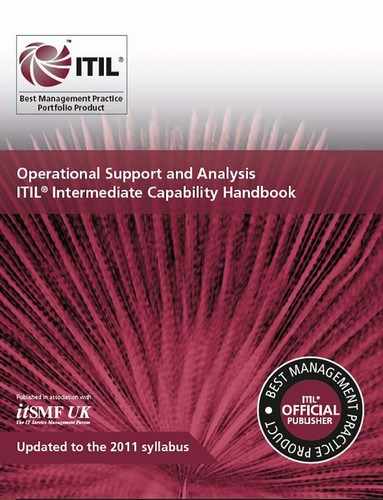10.1OVERVIEW
The ITIL qualification scheme has four levels:
- Foundation level
- Intermediate level (Lifecycle and Capability streams)
- ITIL Expert
- ITIL Master.
There are also further complementary service management qualifications available that can contribute (accumulating credits) towards achievement of the ITIL Expert. Further details of these can be found at:
www.itil-officialsite.com/Qualifications/ComplementaryQualifications.aspx
10.2FOUNDATION LEVEL
The Foundation level ensures candidates gain knowledge of the ITIL terminology, structure and basic concepts, and comprehend the core principles of ITIL practices for service management. Foundation represents two credits towards the ITIL Expert.
10.3INTERMEDIATE LEVEL
There are two streams in the Intermediate level, assessing an individual’s ability to analyse and apply concepts of ITIL:
- Lifecycle stream
- Capability stream.
The Lifecycle stream is built around the five core publications and is for candidates wanting to gain knowledge within the service lifecycle context. Each module achieves three credits.
10.3.2Capability stream
The Capability stream is built around four practitioner-based clusters and is for candidates wanting to gain knowledge of specific processes and roles. Each module achieves four credits:
- Planning, protection and optimization (PPO) Including capacity management, availability management, IT service continuity management, information security management, and demand management
- Service offerings and agreements (SOA) Including service portfolio management, service level management, service catalogue management, demand management, supplier management, and financial management for IT services
- Release, control and validation (RCV) Including change management, release and deployment management, service validation and testing, service asset and configuration management, knowledge management, request fulfilment, and change evaluation
- Operational support and analysis (OSA) Including event management, incident management, request fulfilment, problem management, access management, service desk, technical management, IT operations management and application management.
Candidates may take units from either of the streams to accumulate credits.
To complete the Intermediate level, the Managing Across the Lifecycle course (five credits) is required to bring together the full essence of a lifecycle approach to service management, consolidating knowledge gained across the qualification scheme.
10.4ITIL EXPERT
Candidates automatically qualify for an ITIL Expert certificate once they have achieved the prerequisite 22 credits from Foundation (the mandatory initial unit) and Intermediate units (including Managing Across the Lifecycle, the mandatory final unit). No further examinations or courses are required.
10.5ITIL MASTER
The ITIL Master qualification validates the capability of the candidate to apply the principles, methods and techniques of ITIL in the workplace.
To achieve the ITIL Master qualification, the candidate must be able to explain and justify how they selected and individually applied a range of knowledge, principles, methods and techniques from ITIL and supporting management techniques, to achieve desired business outcomes in one or more practical assignments.
To be eligible for the ITIL Master qualification, candidates must have reached the ITIL Expert level and worked in IT service management for at least five years in leadership, managerial or higher-management advisory levels.
